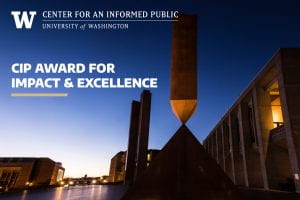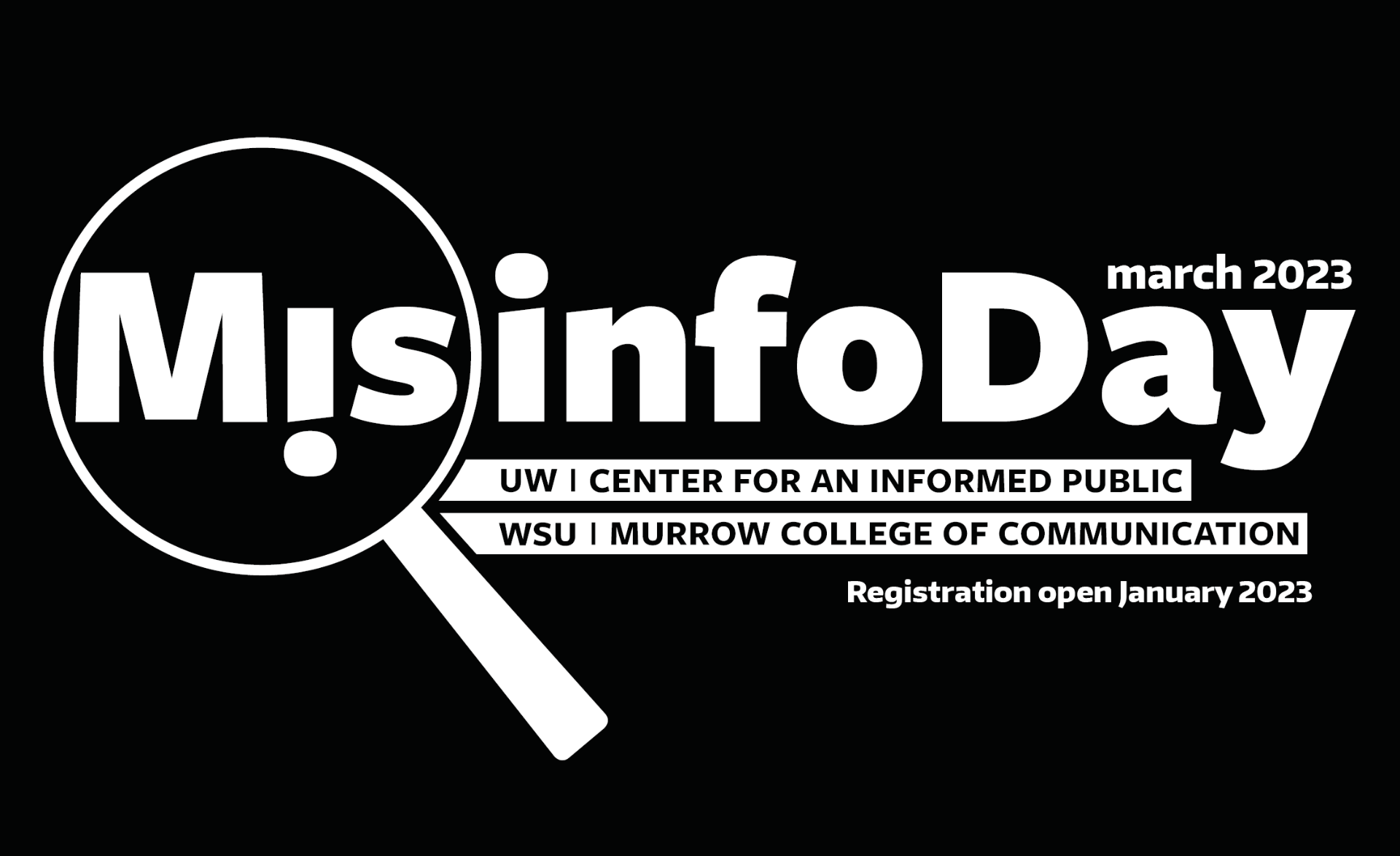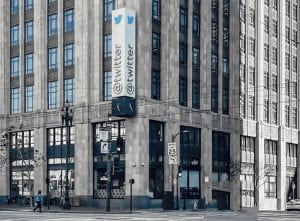This is the web version of the March 2023 edition of the Center for an Informed Public‘s News & Insights newsletter that was originally sent out on March 2, 2023.
NEWS
CIP adds 4 new UW faculty members from Human Centered Design & Engineering, Law and Psychology
The Center for an Informed Public has named four new faculty members (pictured above, from left), Gary Hsieh (HCDE), Cheryl Kaiser (Psychology), Lisa Manheim (Law) and Zahr Said (Law), bolstering the CIP’s multidisciplinary research and expertise.
UW IMPACT EVENT | MARCH 30
CIP’s Kate Starbird to discuss rumoring during the 2022 U.S. midterm elections
 UW Impact presents an online conversation with UW Center for an Informed Public director Kate Starbird. UW Impact director Courtney Acitelli will joins Starbird online for a frank conversation about the 2022 midterm elections, how bad-faith actors can manipulate information and how we can work together to reduce genuine confusion as 2024 approaches.
UW Impact presents an online conversation with UW Center for an Informed Public director Kate Starbird. UW Impact director Courtney Acitelli will joins Starbird online for a frank conversation about the 2022 midterm elections, how bad-faith actors can manipulate information and how we can work together to reduce genuine confusion as 2024 approaches.
CALL FOR NOMINATIONS
We’re currently seeking nominations for the CIP Award for Impact & Excellence
 The CIP is seeking nominations for an award program that will recognize an individual or organization that has made outstanding contributions, achievements, or bodies of work that significantly resist strategic misinformation, promote an informed society, and strengthen democratic discourse.
The CIP is seeking nominations for an award program that will recognize an individual or organization that has made outstanding contributions, achievements, or bodies of work that significantly resist strategic misinformation, promote an informed society, and strengthen democratic discourse.
EDUCATION

Here’s what we have planned for MisinfoDay 2023
Nearly 1,000 high school students, teachers, librarians and other educators from across Washington will travel to the University of Washington and Washington State University in the coming weeks to participate in MisinfoDay 2023 activities, co-presented through a statewide partnership between UW’s Center for an Informed Public and WSU’s Edward R. Murrow College of Communication.
***
What we can learn from Finland
In a Q&A interview, CIP co-founder Jevin D. West, an iSchool associate professor, expands upon the CIP’s ongoing collaborations with Finnish peers around media literacy educational efforts, where this work is going, and what we can learn from Finland. In 2023, West be giving research talks at Finnish organizations and coordinating lab exchanges with Finnish researchers. The CIP is also looking to incorporate Finnish programs around media literacy into current programming and resources.
INSIGHTS
Why bad information can linger in your brain
“When we receive a correction about something we already know, we don’t simply erase the old information from our minds. Rather, representations of both the old information and its correction coexist in our brain’s knowledge networks, playing a role in guiding our future judgments and beliefs,” CIP postdoctoral scholar Madeline Jalbert, who studies social and cognitive psychology, wrote in a recently contributed article in The Seattle Times about the continued influence effect. “We’re especially likely to rely on old information when it’s the only explanation we have, or the one that comes to mind the easiest.”
RESEARCH NOTES
Twitter API access chances may mark an ‘end of an era’ for academic research on the platform
 In early February, Twitter announced that it would no longer support free access to its application programming interface (API), a move that for many academic researchers, including those at the CIP, “will profoundly change how researchers (and society) can study and understand online behavior,” CIP director Kate Starbird observed in a Feb. 2 Mastodon thread. As National Public Radio’s Jingnan Huo reported in a Feb. 9 article: “Starbird’s team is throwing ideas around what they can do with Twitter if their current level of access ceases. They intend to focus on Telegram, TikTok and Reddit along with Twitter for the 2024 presidential election while collaborating with teams that monitor other platforms.”
In early February, Twitter announced that it would no longer support free access to its application programming interface (API), a move that for many academic researchers, including those at the CIP, “will profoundly change how researchers (and society) can study and understand online behavior,” CIP director Kate Starbird observed in a Feb. 2 Mastodon thread. As National Public Radio’s Jingnan Huo reported in a Feb. 9 article: “Starbird’s team is throwing ideas around what they can do with Twitter if their current level of access ceases. They intend to focus on Telegram, TikTok and Reddit along with Twitter for the 2024 presidential election while collaborating with teams that monitor other platforms.”
- CIP blog post: “Twitter’s API access changes may mark ‘end of an era’ in academic research on the platform“
- NPR: “Twitter’s new data access rules will make social media research harder”
***
In January, the ACM Transactions on Social Computing accepted and published a paper by Kaitlyn Zhou, Tom Wilson, and CIP co-founders Kate Starbird and Emma S. Spiro. “Spotlight tweets: A lens for exploring attention dynamics within online sensemaking during crisis events,” which, as Starbird noted in a Mastodon thread, looks at “sensemaking during the 2018 Hawaii missile crisis, makes several contributions, including: presenting the concept of ‘spotlighting’ and introducing our cumulative graph technique, which reveals how audience exposure affects the propagation of social media posts.”
***
In recent weeks, the CIP has hosted a variety of scholars as invited speakers: Mallory Harris, a Stanford University PhD student who has been studying infectious disease and misinformation and currently collaborating on CIP-related research; UW HCDE associate professor and CIP faculty member Gary Hsieh who presented research around increasing the impact of academic papers; and Matthew Brooke, a PhD candidate in sociology at Harvard University who spoke about his research into rise of the radical right in the 1950s, ‘60s and ‘70s.
CIP IN THE NEWS
Spinning up fake news sites using ChatGPT and signals of news credibility
“Previously a well written, well laid out publication with headshots and bylines, etc., meant something,” CIP research scientist Mike Caulfield said in a recent interview with Alex Mahadevan, director of MediaWise at the Poynter Institute. “It didn’t always mean it was reputable, but there was at least a partial correlation between something looking that way and being known, or ‘real’ — even if ‘real’ and wrong. Signals of authority were expensive, and that formed a barrier to entry.” But with ChatGPT and other AI tools, the technological barriers to entry to dupe and mislead online are no longer as high.
***
A March 6, 2020, tweet from CIP faculty member Carl T. Bergstrom was featured in a Feb. 10 New York Times Opinion article, “How Twitter Changed the World in 25 Tweets.” In the tweet, Bergstrom, an epidemiologist and UW Department of Biology professor, shared a chart, originally adapted by population health analyst Drew Harris, and a thread explaining how lockdowns could flatten the COVID-19 curve.
***
Read more CIP in the News highlights for January and February, including articles and interviews featuring CIP researchers, including The Atlantic, Tech Policy Press, KIRO 7 News, ArtForum, and Seattle magazine.




